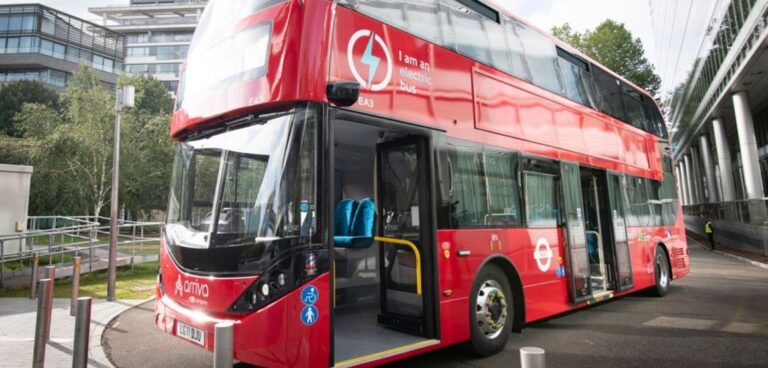All new buses ordered by Transport for London (TfL) for the capital will be zero-emission, according to mayor of London Sadiq Khan.
The announcement came as Khan hosted the Zero Emission Bus Summit at City Hall. Organised by Campaign for Better Transport and TfL, the event was attended by representatives from central and local government, bus operators, manufacturers and wider stakeholders to drive forward the uptake of zero-emission buses across the UK.
Khan said: “In the year of COP26 and after setting out my ambition for London to be net zero by 2030, I’m committed to do all I can to help clean up the transport network and reduce its emissions.
“Today, as part of our work to tackle both the harmful emissions we breathe and the climate emergency, I am proud to announce that London will no longer procure new diesel or hybrid buses and will only procure zero-emission buses.”
TfL currently has 950 zero-emission buses on the road or on order and its entire bus fleet is now compliant with the Euro VI emission standard – the same standard as the Ultra Low Emission Zone, which is due to expand to the boundaries of the north and south circular roads next month.
However, road traffic, including cars and vans as well as buses, is cited as the single biggest source of air pollution in the capital and accounts for around half of all emissions of nitrogen oxides and particulate matter, while transport reportedly produces one quarter of London’s carbon emissions.
Thus, TfL said it is keen to move to battery-electric and hydrogen power to eradicate harmful air pollutants and carbon dioxide from its vehicles’ propulsion systems. According to the operator, a zero-emission bus network in London will reportedly save four million tonnes of carbon by 2037.
However, with the UK government aiming to reduce carbon emissions by 68% by 2030, TfL said it hopes to bring London’s bus fleet into the scope of delivering on that target and achieve a fully zero-emission fleet by the same year, thereby saving an additional one million tonnes of carbon.
Louise Cheeseman, TfL’s director of buses, said: “We’ve done everything possible to make the bus network clean and now we are focussed on making it green, which is why it’s so important that we’re able to commit that all new buses in London will be zero-emission.
“We’re now working to have a completely zero-emission bus network as soon as possible, and with government support we could do this by 2030 while also stimulating the bus market.”
With London making up a third to half of all new bus orders in the UK in any given year, increasing the number of zero-emission buses in the capital will also support as many as 3,000 jobs across the UK, such as at the Alexander Dennis factories in Scarborough and Falkirk, Switch Mobility near Leeds and Wrightbus in Ballymena, Northern Ireland.
The news was welcomed by Paul Davies, president and managing director of Alexander Dennis, who said: “Transport for London’s accelerated investment in zero-emission buses is great news for the environment and the people of London as much as for the communities and businesses across the UK where these buses will be designed and manufactured, not only helping to underpin skilled jobs and apprenticeships but providing the strong foundation that the UK bus industry needs to prosper both domestically and internationally.
“The UK government has the opportunity to further strengthen Britain’s bus manufacturing industry and its world-class expertise in clean bus technology by enabling an even faster transition through additional funding for London.”





